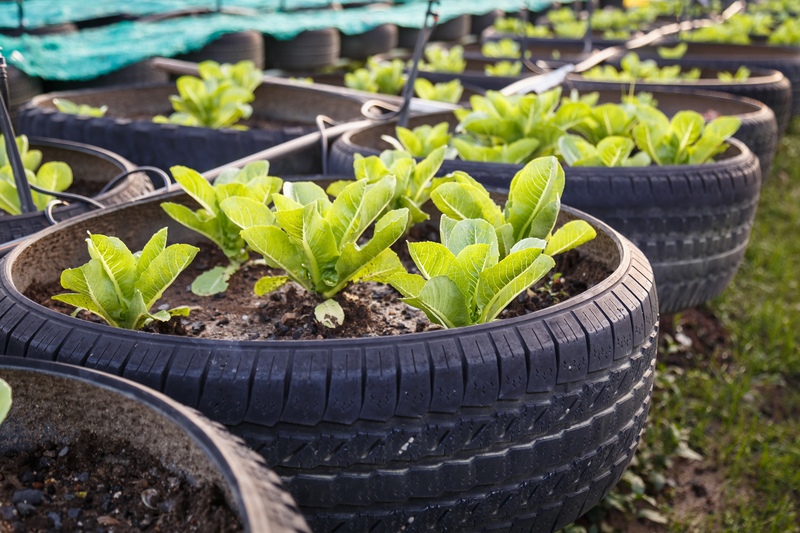Exploring Eco-Conscious Ways to Dispose of Pots and Pans
Are those old pots and pans gathering dust in your cupboards? Maybe you've upgraded your cookware or inherited a mismatched set and want to clear some space. But, if you're an eco-conscious individual, you might be wondering: What are the most environmentally friendly ways to dispose of old cookware? Instead of simply tossing them in the trash, there are multiple sustainable options to ensure your cast iron skillets, stainless steel pots, and non-stick pans find a new purpose. Read on as we comprehensively explore eco-conscious ways to dispose of pots and pans--helping you reduce waste, support your community, and preserve the planet.
Why Should Pots and Pans Be Disposed of Responsibly?
Many household items, including cookware, are often made of materials that don't break down easily in the landfill. Aluminum, stainless steel, cast iron, copper, and even non-stick coatings can remain in the environment for centuries. Besides, tossing them out contributes to the ever-growing issue of landfill waste. Choosing sustainable alternatives for old kitchenware disposal not only conserves resources but can also benefit local communities and reduce environmental pollutants.
- Resource Conservation: Recycling metals allows manufacturers to use less new material, saving both energy and raw resources.
- Waste Reduction: Diverting cookware from landfills cuts down on pollution and frees up precious landfill space.
- Environmental Stewardship: Proper disposal methods reduce the risk of harmful chemicals leaching from coatings and other components.

Preparing Old Pots and Pans for Discarding
Before you begin your journey of responsible disposal, it's important to properly prepare your cookware. The following steps can make recycling or donation more effective:
- Clean the cookware thoroughly. Remove any food residues or grease, as dirty pans can contaminate recycling processes.
- Inspect for significant damage. Severely warped, rusty, or heavily scratched pans are less likely to be accepted for donation but may still be recyclable.
- Remove non-metal parts if possible. Handles made of wood, plastic, or rubber should be separated from the metal body to aid in recycling.
Eco-Friendly Methods to Dispose of Cookware
Now that your pots and pans are prepped, let's examine the diverse array of eco-conscious cookware disposal options available.
1. Donation: Give Cookware a Second Life
One of the best methods to ensure your pans avoid the landfill is donation. If your cookware is still functional--free of cracks, holes, or severely damaged surfaces--there's likely someone who can put it to use.
- Charity Thrift Stores: Organizations like Goodwill, The Salvation Army, and local charity shops frequently accept gently used cookware.
- Homeless Shelters and Soup Kitchens: These organizations often run on limited resources. Your donated pots and pans could directly benefit those in need.
- Community Centers or Schools: Some community kitchens or school programs may need additional cookware for teaching and events.
- Online Freecycle Groups: Join local networks such as Freecycle or OfferUp, and list your gently used cookware for neighbors to collect.
Tip: Always call ahead to confirm donation policies. Some organizations have requirements on the condition or types of cookware they accept.
2. Recycling: Choose Metal Recovery over Landfill
If your pots and pans are truly past their prime, recycling old cookware is a superior option to tossing them in the waste bin. Here's how you can recycle most types of cookware:
- City Recycling Programs: Many municipalities have programs that accept scrap metal. Contact your local recycling center to verify if they accept pots and pans--and what preparation they require.
- Specialized Scrap Yards: Scrap metal facilities will often take cookware, especially if it's steel, cast iron, aluminum, or copper. Some even pay small amounts for valuable metals.
- Retailer Take-Back Programs: Certain home goods stores and cookware manufacturers offer recycle-or-return programs encouraging customers to bring back their used cookware for proper recycling.
Attention: Non-stick and ceramic-coated pans raise recycling concerns. Many facilities will not accept these due to their chemical coatings. Check with your recycler first or seek out specialty programs focused on safe handling of such items.
3. Upcycling: Creative Uses for Old Pots and Pans
For lovers of DIY and sustainability, upcycling cookware into something new is both fun and earth-friendly. Cast-off cookware can become:
- Planters: Old saucepans, frying pans, or Dutch ovens make unique and whimsical planters for flowers, succulents, or herbs.
- Bird Baths or Feeders: Convert deep pans into bird baths, or hang shallow skillets as bird feeders in your garden.
- Wall Art: Arrange lids, pans, or saucepan handles into creative wall decor for your kitchen or patio.
- Organizers: Use pans as storage bins in workshops, garages, or craft rooms to keep small parts or accessories sorted.
- Lighting Fixtures: With some basic electrical know-how, transform a colander or metal pan into an industrial-style pendant light.
Not only does upcycling divert cookware from landfills, but it also gives your home a distinctive, personal flair.
4. Manufacturer Take-Back or Trade-In Programs
Leading brands frequently offer cookware recycling programs or discounts when you trade in your old pots and pans. For example:
- Le Creuset: Occasionally hosts events to collect unwanted enameled cast iron for responsible recycling.
- TerraCycle: Partners with select cookware brands to offer mail-in recycling for hard-to-recycle kitchen items.
- Retailer Buyback: Williams Sonoma and similar stores have, at times, provided trade-in incentives for eco-friendly upgrades.
Research your cookware brand's website or inquire at your local store about current or upcoming eco-conscious disposal opportunities.
5. Disposal Through Specialized Waste Collections
If none of the above options work for your specific pots and pans--especially those with mixed materials or hazardous non-stick surfaces--consider specialized disposal:
- Hazardous Waste Events: Some municipalities host periodic collection days for items not suitable for regular recycling, including Teflon-coated cookware.
- E-Waste and Appliance Days: While intended for electronics and appliances, some events accept small metal items. Check eligibility with your local program.
Important: When disposing of Teflon or similar chemically coated pans, avoid breaking or burning them. Improper disposal can release toxins harmful to the environment and human health.
Eco-Conscious Disposal by Cookware Material
Not all pots and pans are created equal--and neither are your disposal options. Here's a breakdown of specific types of cookware and their best environmental solutions:
Recycling and Disposing of Stainless Steel & Aluminum Cookware
- Highly recyclable and accepted at most scrap metal dealers and recycling centers.
- Separate handles and non-metal parts for purer recycling content.
Recycling Cast Iron Pans Responsibly
- Extremely long-lasting--often best repaired and reused.
- If beyond repair, cast iron is highly valuable as scrap metal. Local metal recyclers will accept these items and ensure the iron is reused in other products.
Disposing of Non-Stick or Teflon-Coated Pans
- Cannot be recycled in most curbside or scrap metal programs due to chemical coatings.
- Contact manufacturers or locate specialty recycling services like TerraCycle for safe recycling.
- As a last resort, disposal through hazardous waste collection events is recommended.
Copper Cookware Sustainability Tips
- Sought after by scrap metal recyclers--be sure to remove non-copper parts for a better price.
- Polished copperware in good condition is popular for upcycling or donation.

Frequently Asked Questions about Cookware Disposal
Can I put old pots and pans in my curbside recycling?
In most locations, standard curbside recycling does not accept cookware due to their size, weight, and mixed material composition. Instead, seek out dedicated scrap metal programs or specialty recycling events.
What should I do with broken non-stick pans?
Do not toss them in the recycling bin. Many recyclers cannot process non-stick coatings. If the pan is from a large cookware brand, check for return/recycling programs. Otherwise, bring them to a hazardous waste facility.
How long do metal pots and pans take to decompose in a landfill?
It can take hundreds of years for metals like aluminum, steel, or cast iron to break down in a landfill, making eco-friendly disposal crucial.
Do I need to remove plastic and wooden handles before recycling?
If possible, yes. Separate as many non-metal components as you can. This increases the likelihood that recyclers can process the pan for metal reuse.
Are there any cookware brands with a strong eco-friendly recycling policy?
Yes! GreenPan and Le Creuset, to name two, have various partnerships and initiatives to encourage sustainable cookware disposal and product longevity.
Conclusion: Making Eco-Conscious Choices with Old Pots and Pans
Disposing of unwanted cookware doesn't have to waste resources or harm the environment. With a bit of planning and creativity, your old pots and pans can embark on a second life--whether through donation, metal recycling, creative upcycling, or responsible disposal. The next time you need to declutter your kitchen, remember: eco-conscious cookware disposal is not only good for the planet--it can also foster connection within your community and inspire creative projects at home.
Ready to get started? Sort your old cookware, research local recycling centers, check out take-back programs, and explore upcycling ideas to ensure your pots and pans leave your kitchen sustainably.
- Donate usable cookware to community organizations or online freecycle groups.
- Recycle metal pots and pans at scrap metal yards or via brand-led initiatives.
- Upcycle into creative home and garden projects for a unique touch.
Your small actions can have a big impact--choose eco-conscious ways to dispose of pots and pans and help build a greener future, one skillet at a time!
Further Reading and Resources
- Recycle Coach - Find local recycling options and tips
- TerraCycle - Specialized recycling solutions for hard-to-recycle items
- Goodwill - Donate items to support local job training programs
- Freecycle - Offer or find free, reusable goods in your community
This guide is your launching point for sustainable kitchen decluttering. Share your journey or favorite upcycling ideas below, and inspire a wave of responsible cookware disposal in your community!